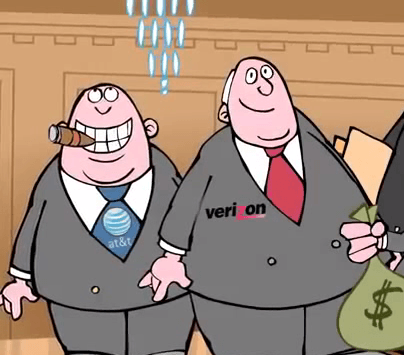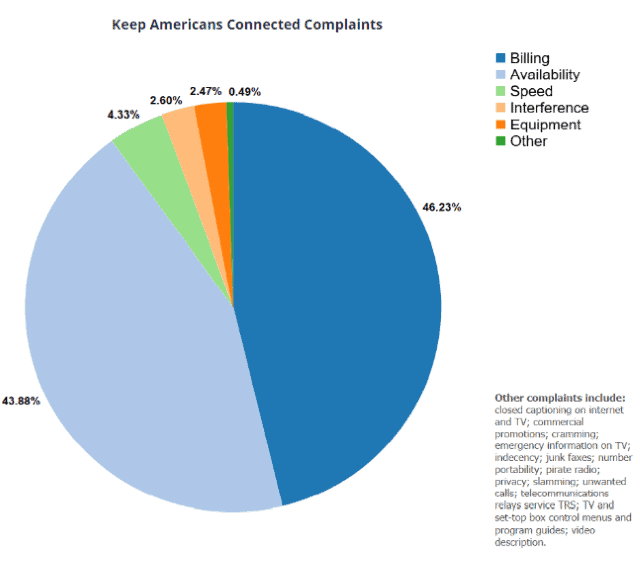
Confusion, frustration, and fine print are all a part of the deal signing up for the $50 Emergency Broadband Benefit, customers complain.
The Biden Administration’s efforts to help economically challenged Americans with their broadband bills is actually a windfall for some of the nation’s largest telecommunications companies, which will pocket the money earned while forcing some customers off discounted promotional and legacy plans they claim do not qualify for bill relief.
The Emergency Broadband Benefit (EBB), rushed through in the early days of the new administration, is a $3.2 billion program that will offer qualifying consumers $50 off their monthly internet bill, at least until this fall when the money funding the program is expected to run out. Internet service provider participation is voluntary, but with billions of free money to be collected, most cable and phone companies are on board with the program. In fact, several are using the new benefit to earn even more money, by writing program rules that cynically exploit their income-challenged customers.
To qualify for the benefit, an individual is eligible if one member of the household:
- Is a participant in one of the qualifying Lifeline programs: Medicaid, SNAP, SSI, FPHA, Veterans and Survivors Pension Benefit;
- Is a resident on a Tribal reservation and participates in one of the following programs: Bureau of Indian Affairs general assistance; Tribally administered Temporary Assistance for Needy Families (Tribal TANF); Head Start (only those households meeting its income qualifying standard); or the Food Distribution Program on Indian Reservations (FDPIR);
- Has applied for and been approved to participate in the National School Lunch Program: receives benefits under the free and reduced-price school lunch program or the school breakfast program, including through the USDA Community Eligibility Provision;
- Has gross household income at or below 135% of the federal poverty guidelines;
- Received a Federal Pell Grant during the current award year;
- Experienced a substantial loss of income since February 29, 2020, and the household had a total income in 2020 below $99,000 for single filers and $198,000 for joint filers. This includes those who are unemployed or experienced unemployment in 2020 and/or were furloughed.
Stop the Cap! has received a few dozen letters from consumers that thought qualifying under the ‘substantial loss of income’ condition would be easy. Instead, they are sharing horror stories about providers unilaterally rejecting their applications, quietly canceling promotional packages, forcing some off less expensive, grandfathered service packages no longer being sold, or requiring customers to upgrade to more costly packages that ultimately left them with a bigger bill than they started with.
In some cases, poor training of customer service representatives seems to be the biggest impediment between you and a cheaper monthly bill. Some companies, including Sparklight, did not seem to even be aware of the highly publicized program. Others, notably Charter and Comcast, gave different answers depending on the representative you reach.
The most cynical provider of them all, however, is Verizon. No ISP makes participation in the EBB program more difficult. The phone company dominates as the largest wireline phone company in the northeast and Mid-Atlantic states and Verizon Wireless is one of the three major wireless carriers. It appears to be using the EBB as a marketing opportunity to upsell customers or drive them off older legacy plans that cost less, even if that is the only plan available.
“Verizon told me flat out ‘no’ that DSL customers cannot receive the $50 discount,” said Ted Rogers. Verizon is his only option for internet service, and only barely so. “We get about 6 Mbps from Verizon, no cell signals at all, and cable internet is just a dream. We live almost a mile from the nearest neighbor.”
Rogers lost his job as a result of the pandemic and is now working two part-time jobs to make ends meet. He told us the broadband benefit would be nice, but in the end is not worth fighting the phone company to get.
“You really have nowhere to go when they reject you, because the program is voluntary,” Rogers told us. “The FCC just passes the complaint back to Verizon and the PSC says it does not regulate internet service.”

Collect the $50, and then even more by forcing customers to switch to more expensive service plans.
Early FiOS customers who signed up for plans they have kept for years are also running straight into a firm “no” from Verizon. The Washington Post shared the stories of several Verizon fiber customers who were told they must upgrade to a more costly plan to qualify for the $50 discount. One customer in Massachusetts would have to give up his internet-only plan costing $62 for basically the same service under a different name — for $79 a month. While the $50 discount will make his internet bill much lower through the summer, when funds run out, he will end up paying $17 more a month indefinitely.
A Virginia customer was told she would have to walk away from her current Verizon internet plan costing $79 a month and switch to a new one for $95 a month, just to get a $50 discount over the next 3-6 months. That is a $16 more a month. In Pennsylvania, a Verizon customer was told she could not get the $50 a month broadband benefit unless she signed up for a costlier TV package and start renting some set top equipment as well. Her bill, after the EBB benefit expires, will be “at least $50 a month higher.”
“In my case, it seems like EBB only benefits Verizon,” she told the Post.
Unlike most telecom companies that claim these kinds of stories are simple misunderstandings or confusion on the part of their customer service team, Verizon spokesman Alex Lawson stepped up to boldly confirm that yes, indeed, the $50 benefit was only good on “qualifying plans.” For everyone else (our phrase): tough luck. But Lawson claims these newer plans allow customers to drop home phone service and typically save customers money. But not always, especially on legacy plans that include all the services a customer wants and special promotional packages which are lost when customers switch plans.
For the record, Verizon limits EBB benefits to these service plans. Notice DSL is excluded and prepaid wireless customers have to speak to a representative to find out if they can qualify:
Mobile:
Verizon Mix & Match Unlimited
Start Unlimited
Play More Unlimited
Do More Unlimited
Get More Unlimited
Above Unlimited
Beyond Unlimited
Go Unlimited (Some Go plans may not be eligible- inquire with rep.)
Standalone Mobile Hotspot plans
Unlimited and Unlimited Plus plans (Standalone mobile hotspot service offerings are those without a smartphone line on the account).
Home:
Fios Mix & Match Internet, any speed
Verizon 5G Home Internet
Verizon LTE Home Internet
Comcast representatives offered a range of responses to customers inquiring about signing up for EBB.
“Talk to one representative, get one story, hang up and call back and you get a completely different story,” said Sha’qwanda, a Comcast customer in Baltimore. “They told me I don’t qualify because I am 15 days late on my bill, then another person told me the plan was only for people on Medicaid, then another person told me I would have to give up my promotion plan they rate locked for a year. My bill would have gone up $54 a month. I can’t afford that. Who is really getting rich here?”
A Philadelphia customer told us Comcast completely messed up their account trying to apply the benefit, canceling their services and charging them for unreturned equipment.
“We lost service the following morning,” the customer wrote us, wishing to remain anonymous. “When we called up, the representative couldn’t figure out what happened, except he saw in the notes we were signed up for EBB, then the account was closed. Our final bill was over $400.”
The Xfinity social media account reached out to us earlier today to clear up the misunderstanding.
If you are a Comcast customer and are having trouble enrolling in EBB, we suggest you tweet a message to @Xfinity and get assistance. We suspect the problem here is insufficient training of customer service representatives to manage enrollments properly.
Charter/Spectrum is using the EBB program as a pry lever to push stubborn customers still holding on to legacy Time Warner Cable or Bright House service plans to switch to Spectrum internet plans and pricing. If you do not make the switch, you won’t qualify for EBB benefits. This is a choice by Charter management, not a limitation imposed by their billing system. Some customers on other legacy plans were also told they do not qualify.
“I am still a subscriber of New York’s Everyday Low Priced Internet service that used to be $15 a month. They have raised the price since, but also effectively jailed me by saying I have to abandon this plan if I want to get the $50 a month off my internet bill,” said Jay, a customer in New York City. “I can never go back either they tell me. Who wrote the rules for this program? The cable companies are using this to force people like me into upgrades I do not want and cannot afford. It’s scandalous.”
Another customer wishing to remain anonymous noted the same month EBB became available, Charter announced rate increases on equipment rentals and the Broadcast TV Fee paid by cable television customers.
“They will be back to raise internet prices again soon, I am sure,” the customer predicted.
AT&T, not to be left behind, also insists that customers choose from a limited menu of premium price plans and can never return to the plan they gave up. Even worse, customers complain you have to call to enroll, and the lines are jammed:
“I waited an hour on hold and then AT&T hung up on me twice,” said Kate Derry from Chicago. “It’s busy signals or waiting on hold forever. It’s like calling the unemployment office during the pandemic. AT&T has decided it should not be easy to enroll in this and I wonder how many people just give up.”
Jon, an AT&T Fiber customer in Dallas seems to agree.
“I finally got through at around 8am Texas time and listened to a representative fumble their way through disclaimers and conditions,” Jon told Stop the Cap! “Several times she had to put her hand over the microphone and ask her supervisor for help. It took an hour to get everything set up, not including the time needed to assemble the qualifying documentation. I really doubt many people are going to go through all this for a few months of savings. There is no excuse for this not to be available for online enrollment.”
![]() Charter Communications this week reduced prices on multi-line unlimited data plans.
Charter Communications this week reduced prices on multi-line unlimited data plans.


 Subscribe
Subscribe After weeks of tense negotiations to secure bipartisan support for the Biden Administration’s $1 trillion infrastructure stimulus measure, the White House appears to have largely capitulated to Republican efforts to water down funding to expand broadband service into a $65 billion package that will doubtless be a financial bonanza to the country’s largest phone and cable operators.
After weeks of tense negotiations to secure bipartisan support for the Biden Administration’s $1 trillion infrastructure stimulus measure, the White House appears to have largely capitulated to Republican efforts to water down funding to expand broadband service into a $65 billion package that will doubtless be a financial bonanza to the country’s largest phone and cable operators. The latest proposal’s idea of solving the broadband affordability issue is to admit there is a problem and declare the need for some kind of low-cost broadband option, but apparently does not specify pricing, who is qualified to get cheaper service, and who will oversee that such programs remain affordable. That allows providers to keep writing the rules of their own token, voluntary efforts to offer discounted internet, like those that disqualify current customers and requires enrollees to jump through various qualification hoops to sign up. The stimulus program will also spend billions of dollars effectively paying a portion of disadvantaged Americans’ internet bills, at the current high prices many ISP’s charge. That is a direct subsidy to big cable and phone companies that can continue charging whatever they please for access, knowing the government will now pay $30-50 of the bill.
The latest proposal’s idea of solving the broadband affordability issue is to admit there is a problem and declare the need for some kind of low-cost broadband option, but apparently does not specify pricing, who is qualified to get cheaper service, and who will oversee that such programs remain affordable. That allows providers to keep writing the rules of their own token, voluntary efforts to offer discounted internet, like those that disqualify current customers and requires enrollees to jump through various qualification hoops to sign up. The stimulus program will also spend billions of dollars effectively paying a portion of disadvantaged Americans’ internet bills, at the current high prices many ISP’s charge. That is a direct subsidy to big cable and phone companies that can continue charging whatever they please for access, knowing the government will now pay $30-50 of the bill.

 Comcast on Wednesday said it will
Comcast on Wednesday said it will 


